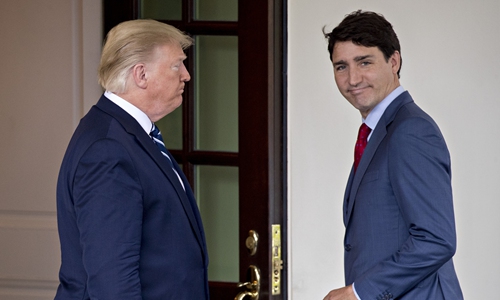Growing uncertainties in Canada raise alarm for Chinese companies
Source:Global Times Published: 2020/5/28 21:23:41

US President Donald Trump (left), and Justin Trudeau, Canada's Prime Minister, walk in to the West Wing of the White House in Washington DC on June 20, 2019.
Before Wednesday's ruling on Huawei executive Meng Wanzhou's extradition case, China's domestic public opinion was dominated by optimism. Yet, the court's decision was disappointing and unexpected, raising concerns over whether China-Canada relations will deteriorate further.
Meng's case calls into question whether risks associated with Canada are greater than expected and whether its business environment will become more complicated. Chinese companies are therefore advised to reassess the uncertainty of doing business in or with the country.
The US has taken a series of actions maliciously targeting China in recent days, including its interference in Hong Kong affairs and passage of a bill related to the Xinjiang Uygur Autonomous Region, among others. The conflict between China and the US is bound to escalate. In that case, we cannot rule out the possibility that the Trump administration may force Canada to join the China-bashing game by putting more pressure on it. Given Canada's relatively high economic reliance on the US, it won't be much of a surprise if it makes decisions in line with the US' stance on individual cases. Considering the Trump administration's aggressive stance on almost everything, it will be increasingly challenging for Canada to seek a balance between the world's two largest economies, adding uncertainties to China-Canada economic and trade ties.
There are plenty of reasons for us to warn Chinese companies against the growing uncertainties in Canada's business environment. In fact, Meng's case is already enough to raise concerns among Chinese companies over whether they will be treated fairly in Canada.
Canada now claims the latest decision in Meng's case was not made based on political bias. If that's the case, and if Canada still values investment and employment opportunities from China, it is time for the Trudeau government to release more signals of good will to calm the nerves of the Chinese business community and to prevent China-Canada relations from plunging into a new freeze. Failure to do so or continuing down the wrong path will only give the impression that Canada is unfriendly toward China, which may incur a response in kind from China.
On Chinese social media, netizens appear even more enraged by the ruling in Meng's case than by US Secretary of State Mike Pompeo's threat of rescinding Hong Kong's special trade status. Moreover, the timing of the ruling is sensitive as it coincides with the US threat. It would be wrong to think that China would have no time or energy to deal with Canada as it is preoccupied with other matters.
Amid his failure to control the virus, Trump is trying to blame China to win votes in his upcoming election, which leaves Canada with the critical choice of whether or not to become an ally of China-hardliners and serve as a tool for Trump's re-election. There is no denying that the Canadian economy relies heavily on the US, with 75 percent of its exports going to the neighboring market, but Chinese investment has also created many jobs and plays an important role in Canada. It is essential for Canada to reconsider its relations with China and send positive signals to advance bilateral cooperation.
Posted in: GT VOICE,OTHER REGIONS